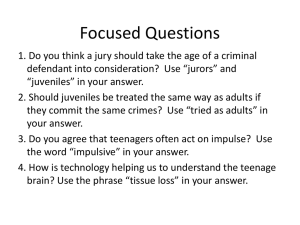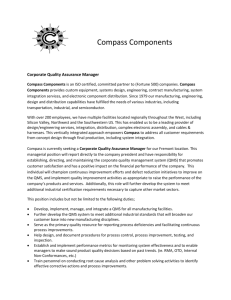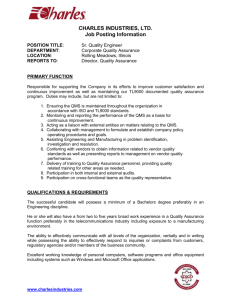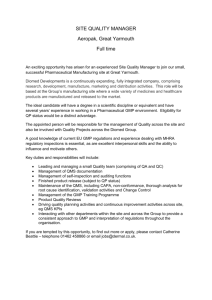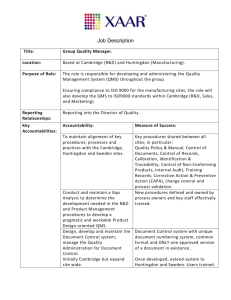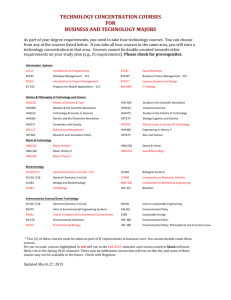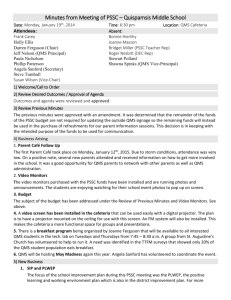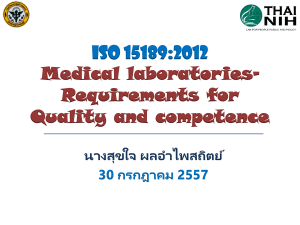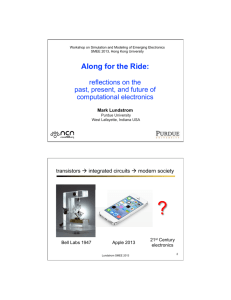Introduction to ECE 305 Spring 2015 (Lundstrom)
advertisement
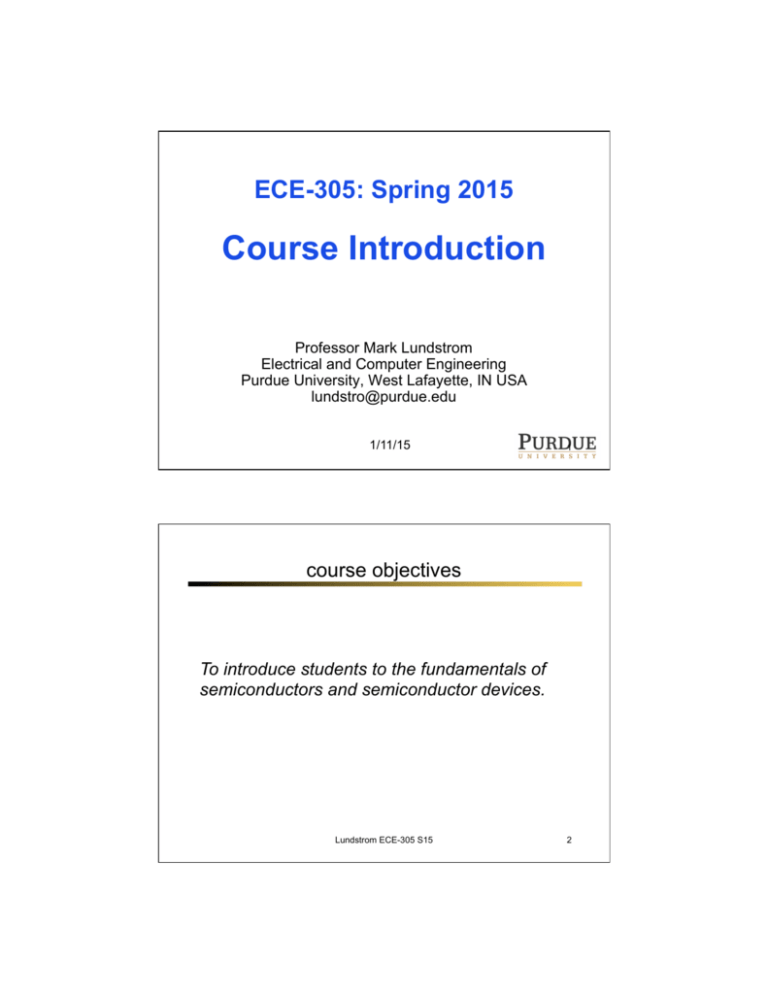
ECE-305: Spring 2015 Course Introduction Professor Mark Lundstrom Electrical and Computer Engineering Purdue University, West Lafayette, IN USA lundstro@purdue.edu 1/11/15 Lundstrom ECE-305 S15 1 course objectives To introduce students to the fundamentals of semiconductors and semiconductor devices. Lundstrom ECE-305 S15 2 electron devices vacuum tube transistor integrated circuit Edison effect, 1880 J.J. Thompson, 1897 diode (Fleming, 1904) triode (De Forest, 1905) Bardeen, Brattain, Shockley, 1947 Kilby /Noyce, 1958 Lundstrom ECE-305 S15 3 electron devices modern solar cell LED semiconductor laser Chapin, Pearson, Fuller, 1954 Holonyak, 1962 Hall, 1962 Lundstrom ECE-305 S15 4 Purdue’s semiconductor history “Karl Lark-Horovitz is best known for turning the physics department of Purdue University, then a backwater school, into a research powerhouse. His personal research was in germanium and solid state science -and if anyone had had a chance of inventing the transistor before Bell, it was Lark-Horovitz. As it was, the Purdue physics lab was probably only six to twelve months behind.” http://www.pbs.org/transistor/album1/ addlbios/lark.html 1941: WWII: Semiconductor diode rectifiers http://www.computerhistory.org Lundstrom ECE-305 S15 5 transistors "The transistor was probably the most important invention of the 20th Century, and the story behind the invention is one of clashing egos and top secret research.” - Ira Flatow, Transistorized! http://www.pbs.org/transistor/ Lundstrom ECE-305 S15 6 transistors symbol amplifier switch D D D G G S G input signal output signal S S 7 Lundstrom ECE-305 S15 real transistors S symbol D G gate electrode source drain G silicon SiO2 D S gate oxide SiON ~ 1.1 nm Lundstrom ECE-305 S15 channel ~ 820 nm transistor IV characteristics (also QV) symbol D G S 9 Lundstrom ECE-305 S15 “The most important moment since humankind emerged as a life form.” Isaac Asimov (speaking about the “planar process” used to manufacture ICs -- invented by Jean Hoerni, Fairchild Semiconductor, 1959). IEEE Spectrum Dec. 2007 Lundstrom ECE-305 S15 10 “Moore’s Law” Nano-electronics L = 5000 nm L = 5 nm ? 5000 nm à 5 nm Microelectronics Lundstrom ECE-305 S15 11 exponential growth transistors per cpu chip 1974 12 Lundstrom ECE-305 S15 21st Century electronics CMOS transistors for logic III-V transistors for RF A/D and D/A convertors Digital Signal processor Microprocessor ROM and FLASH memory www.apple.com Lundstrom ECE-305 S15 CMOS imager Gyroscope MEMS devices Magnetometer Microphone, speaker LCD display and touch screen 13 what engineers have done “If someone from the 1950’s suddenly appeared today, what would be the most difficult thing to explain to them about today?” Lundstrom ECE-305 S15 14 most popular answer “I possess a device in my pocket that is capable of assessing the entirety of information known to humankind. I use it to look at pictures of cats and get into arguments with strangers.” 15 Lundstrom ECE-305 S15 21st Century electronics ? Bell Labs 1947 Apple 2007 Lundstrom ECE-305 S15 21st Century electronics 16 “the end of Moore’s Law?” 17 http://www.eetimes.com/document.asp?doc_id=1323476&page_number=4 Intel meeting: September 2014 14 nm technology (ramping up) 10 nm (productizing) 7 nm (integrating) 5 nm (research) Biggest concern: energy dissipation. Biggest source of energy dissipation: moving data in and out of memory. Need a fundamentally better transistor, but it is really hard to find one. 18 More than Moore: example: gene sequencing http://www.genome.gov/sequencingcosts/ Lundstrom ECE-305 S15 19 Electronics beyond Moore’s Law Ion Torrent (Nature, 475, 349, 21 July, 2011) Lundstrom ECE-305 S15 20 Google contact lens http://www.healthline.com/health-news/diabetes-google-developsglucose-monitoring-contact-lens-012314 21 Lundstrom ECE-305 S15 21st Century electronics ? Bell Labs 1947 Apple 2007 Lundstrom ECE-305 S15 21st Century electronics 22 course outline Course objectives: To introduce students to the fundamentals of semiconductors and semiconductor devices. Part 1: Semiconductor Fundamentals: 5 weeks Part 2: PN diodes, MS diodes, and devices 5 weeks Part 3: Transistors 5 weeks Lundstrom ECE-305 S15 23 ECE-255 / 305 / 455-456 VDD S D G υ in υ out = −gm RDυin source drain silicon Lundstrom ECE-305 S15 SiO2 RD 24 course text Semiconductor Device Fundamentals, 2nd Edition (SDF) R.F. Pierret, Addison-Wesley Publishing Co, 1996. ISBN-0-201-54393-1 Lundstrom ECE-305 S15 25 grading 550 total course points Homework assigned. Solutions posted. Not graded. In-class quizzes (maximum of 50 points) 6 exams (5 in class + “final”, maximum of 100 points each) Total score: The sum of the highest 4 of exams 1-5 and exam 6 plus your quiz total. You must take Exam 6. Lundstrom ECE-305 S15 26 frequent exams 1) Multiple choices (5 questions) 25 points 2) Problem 1 (usually 25 points) 3) Problem 2 (usually 25 points) 4) Exam score: (# correct / 75) x 100 Lundstrom ECE-305 S15 27 frequent exams 28 course web page All course information is posted on the class home page http://nanohub.org/groups/ece305lundstrom Class announcements will supersede prior written information and will be posted on the course homepage Campus Emergency Policies: In the event of a major campus emergency, course requirements, deadlines and grading percentages are subject to changes that may be necessitated by a revised semester calendar or other circumstances. Information about changes will be posted on the course web page and available from lundstro@purdue.edu Lundstrom ECE-305 S15 29 ABET outcomes (i) An understanding of the semiconductor bonding and energy band models, of semiconductor carrier properties and statistics, and of carrier action. (ii) An ability to apply standard device models to explain/calculate critical internal parameters and standard terminal characteristics of the pnjunction diode and the Schottky diode (iii) An ability to apply standard device models to explain/calculate critical internal parameters and standard terminal characteristics of the MetalOxide-Semiconductor Field Effect Transistor and the Bipolar Junction Transistor Assessment: Exams 1 and 2 will assess outcome (i), exams 3 and 4 will access outcome (ii), and exams 5 and 6 will access outcome (iii). Lundstrom ECE-305 S15 30 EMERGENCY PREPAREDNESS To report an emergency, call 911. To obtain updates regarding an ongoing emergency, sign up for Purdue Alert text messages, view www.purdue.edu/ea. There are nearly 300 Emergency Telephones outdoors across campus and in parking garages that connect directly to the PUPD. If you feel threatened or need help, push the button and you will be connected immediately. If we hear a fire alarm during class we will immediately suspend class, evacuate the building, and proceed outdoors. Do not use the elevator. If we are notified during class of a Shelter in Place requirement for a tornado warning, we will suspend class and shelter. If we are notified during class of a Shelter in Place requirement for a hazardous materials release, or a civil disturbance, including a shooting or other use of weapons, we will suspend class and shelter in the classroom, shutting the door and turning off the lights. Please review the Emergency Preparedness website for additional information. http://www.purdue.edu/ehps/emergency_preparedness/index.html Lundstrom ECE-305 S15 31 cheating It’s wrong. I have a zero tolerance policy. Any case of cheating will earn you an F in the course and a report to the Dean of Students. -­‐-­‐-­‐-­‐-­‐-­‐-­‐-­‐-­‐-­‐-­‐-­‐-­‐-­‐-­‐-­‐-­‐-­‐-­‐-­‐-­‐-­‐-­‐-­‐-­‐ Exam Integrity Statement -­‐-­‐-­‐-­‐-­‐-­‐-­‐-­‐-­‐-­‐-­‐-­‐-­‐-­‐-­‐-­‐-­‐-­‐-­‐-­‐-­‐-­‐-­‐-­‐-­‐ I understand that if I am caught cheating on this exam or anything else in this course, I will earn an F for the course and be reported to the Dean of Students. Read and understood; ______________________________________________ Signature 32 questions Lundstrom ECE-305 S15 33 Google Official: on “ideal recruits” "There is no single set of discrete skills one can learn that will last an entire career in high-tech," Johnson writes. Instead, "ideal recruits are creative, adaptable and autonomous, and they have achieved a deep understanding of core subjects such as math, physics and computer science that make it possible to have a razor-sharp intuition and an ability to assimilate new subjects and technologies quickly, without even the expectation of being trained; they train themselves on the skills du jour as the need arises and with minimum help or structure.” Bruce Johnson, the Atlanta site and engineering director for Google, in the Atlanta Journal-Constitution (12/23/11. Lundstrom ECE-305 S15 34 How to study 1) Do the assigned reading before class 2) Attend class and pay attention 3) Review the lecture after class 4) Do the HW without looking at the solutions 5) Review and understand the solutions 6) Be sure you understand the quizzes 7) Ask questions Lundstrom ECE-305 S15 35 ECE Honors Consider signing an “Honors contract” for ECE 305 Lundstrom ECE-305 S15 36 you’re in training “I hated every minute of training, but I said, 'Don't quit. Suffer now and live the rest of your life as a champion.’” -Muhammad Ali http://www.brainyquote.com/quotes/quotes/m/muhammadal148629.html. 37 ECE 305 Work hard, have fun, learn something you can use for the rest of your career. Get started now! https://nanohub.org/groups/ece305lundstrom 38 Lundstrom ECE-305 S15
